► The best luxury electric cars on sale in the UK in 2025
► All-electric cars that offer the best in comfort and refinement
► CAR picks out its favourite premium luxury electric cars
There’s a lot of choice in the electric car market these days, as a glance at our list of best electric cars ably demonstrates. For example, electric hatches, saloons, small EVs, and more are all on offer – and, nowadays, there are lots of luxury electric cars available as well.
Using electric power for a luxury car makes good sense, after all, thanks to the inherently quiet and refined nature of all-electric powertrains. But there’s more to a luxury car than just outright mechanical refinement, including facets such as fine build quality, excellent ride comfort, and high-end technology and features.
The best luxury electric cars at a glance
- Best luxury electric saloon: BMW i7 – read more
- Best electric luxury SUV: BMW iX – read more
- Best luxury sports EV: Porsche Taycan – read more
If you’re shopping for a premium electric car, you might be wondering what’s out there, and what might suit you best. To help give you some idea of what’s around, and to help you quickly narrow down your options, we’ve gathered up some of our favourite luxury electric cars.
Best luxury electric cars available in the UK in 2025
BMW iX
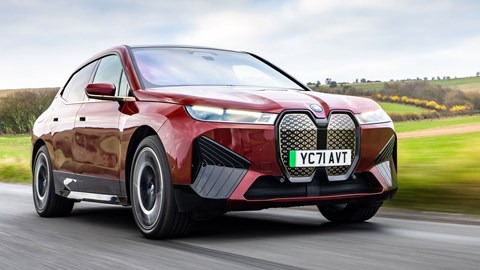
Best for: Those seeking a luxury electric SUV with BMW’s signature driving dynamics
Pros: Impressive range, powerful performance, and a luxurious interior
Cons: Premium price tag and design might not appeal to all
The BMW iX SUV might not be Munich’s first EV, but it’s the most important. Look past the ‘distinctive’ design and focus on the performance metrics: the xDrive50 variant, priced from £91k offers a commendable range of up to 380 miles, though real-world testing suggests a more practical 305 miles. The iX may look like a block, but its aerodynamically optimised design achieves a drag coefficient of 0.25. What’s more, there’s a strong 516bhp from the entry-level model, and a 611bhp flagship iX M60, which accelerates from 0-62mph in just 3.8 seconds. That’s probably fast enough.
Step inside the iX and you’ll find some serious luxury, with features like a panoramic roof and a state-of-the-art iDrive infotainment system. When compared to rivals, the iX offers a unique blend of BMW’s signature driving dynamics and the benefits of electric propulsion. For example, the M60 version, while not a traditional M car, still provides am engaging driving experience, balancing agility with comfort. Overall, the BMW iX is one of the most complete EVs you can buy – if you don’t mind its looks.
Read our full BMW iX review.
View BMW iX lease deals VIEW OFFER
Porsche Taycan Cross Turismo
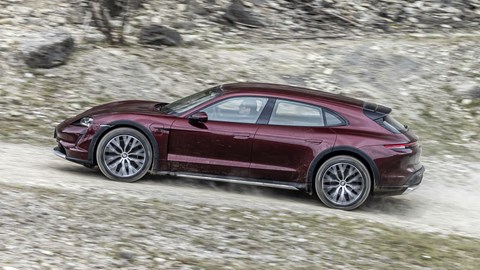
Best for: Enthusiasts wanting a sporty yet practical electric vehicle experience
Pros: Stellar performance, increased versatility, and impeccable build quality
Cons: Efficiency could be better; rear door access is slightly restrictive
The Cross Turismo is the latest expansion to Porsche’s electric Taycan lineup, and goes some way to show just how dedicated to BEVs Stuttgart is. Positioned as an ‘off-road’ Taycan, this Cross Turismo isn’t just trying to be an electric sports car but also a practical family vehicle. The specs aren’t bad either; the Cross Turismo offers a range between 242-283 miles, depending on the model. Charging times are speedy thanks to the car’s 800V charging system, ensuring practicality for longer journeys.
The car’s performance is undeniably Porsche too, with the Turbo S variant boasting a staggering 750bhp on overboost and achieving 0-62mph in under 3 seconds. The interior is everything you’d expect from the crest, and blends luxury and technology, with a focus on comfort and competitive rear-seat headroom. The boot space is adequate, but the rear doors could be more accommodating for easier access.
Despite these minor setbacks, the Taycan Cross Turismo stands out for its build quality, performance, and practicality. For those looking sports car thrills with family car convenience in an EV, the 4S Cross Turismo could be the ideal choice.
Read our full Porsche Taycan Cross Turismo review.
View Porsche Taycan lease deals VIEW OFFER
Polestar 2
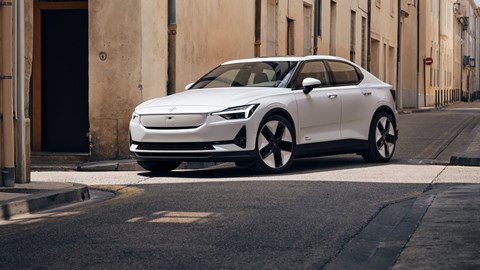
Best for: Eco-conscious drivers seeking a blend of performance and luxury in an EV
Pros: Impressive range, intuitive infotainment system, and sustainable interior choices
Cons: Stiff chassis affects ride quality; some rivals offer better driving dynamics
Polestar may have started off as an offshoot of the Volvo brand, but it’s now taking the fight to Tesla with cars like this; the 2. With a starting price that’s competitive in its segment, the Polestar 2 offers a range of up to 406 miles on the WLTP cycle, outperforming both the Tesla Model 3 and BMW i4. This range, however, is more realistically around 330 miles based on real-world testing. You don’t lose out on performance and charging isn’t slow either; a 7kW wallbox can fully charge the car overnight, while a 150kW rapid charger can get it to 80% in just 28 minutes.
Inside, the Polestar 2 boasts a vegan-friendly interior, a testament to its commitment to sustainability. The infotainment system, based on Google’s HMI, is intuitive and offers features like an integrated Google Maps app. However, the Polestar 2’s chassis and suspension may be a little too stuff for some, affecting the overall ride quality.
In comparison to its rivals, the Polestar 2 offers a unique blend of performance, luxury but also sustainability, making it a strong contender for those looking for an EV with a conscience.
Read our full Polestar 2 review.
View Polestar 2 lease deals VIEW OFFER
Genesis Electrified G80
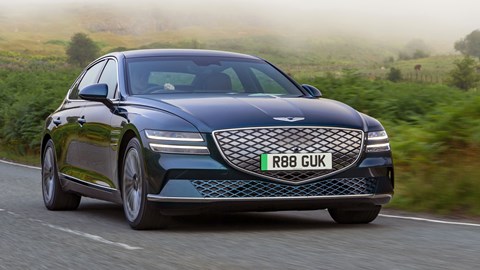
Best for: Luxury enthusiasts looking for a unique electric saloon experience.
Pros: Luxurious interiors, rapid charging, and a distinctive design
Cons: Expensive compared to established rivals, small boot
The Genesis brand is relatively new in the UK, but it’s best to think of it as the premium Lexus badge to Hyundai and Kia’s Toyota proposition. There are a range of cars on offer, but the G80 is aims to carve a niche in the premium EV market.
Priced from a substantial £65,805, this electric variant of the G80 offers a commendable range of up to 323 miles, powered by an 87.2kWh battery pack. With dual motor all-wheel drive, the car boasts 365hp, enabling a 0-62mph sprint in just 4.9 seconds. The design is distinctive enough, and Genesis has upped the premium feel inside too. The G80’s interior features everything from digital instruments, and a head-up display to the Blind Spot Monitor View system. Charging is competitive, as the G80 has the capability to achieve a 10-80% charge in a mere 21 minutes. The electrified G80 may offer luxury and straight-line speed like some of its rivals, but it doesn’t match the sheer driving thrill of its competitors. Still, it’s a good alternative choice.
However, to access some of the car’s most enticing features, buyers will need to delve into various option packs, and ticking those boxes can quickly bump up the price.
Read our full Genesis Electrified G80 review.
View Genesis G80 lease deals VIEW OFFER
Audi e-tron GT quattro
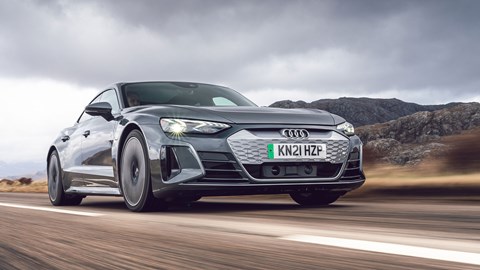
Best for: Those seeking a luxurious grand tourer experience in an electric vehicle
Pros: Luxurious design, impressive range, and true GT performance
Cons: RS variant seems conflicted; pricier than some rivals
The e-Tron GT is Audi’s electric take on the grand tourer. Sharing its all-electric J1 platform with the Porsche Taycan, the e-Tron GT offers a distinct driving experience from its Stuttgart sibling. Available in two versions: the standard e-Tron GT quattro and the more potent RS, the quattro, with its 469bhp powertrain, achieves 0-62mph in 4.1 seconds and offers a range of 295 miles. The RS, although sportier, has a slightly reduced range of 280 miles.
The interior is pure Ingolstadt, and is distinct from the Taycan’s design, focusing on digital instruments, high-quality materials and a more ‘Audi’ look. Unlike the sportier Porsche, the e-Tron GT’s driving dynamics are more geared towards comfort, making it ideal for longer drives and cross-continental journeys. Its 800-volt architecture ensures efficient charging, making long tours feasible with proper planning. Out of the two models, we’d probably pick the quattro; the RS isn’t sporty enough to live with the Taycan.
Read our full Audi e-tron GT review.
View Audi e-tron GT lease deals VIEW OFFER
BMW i7
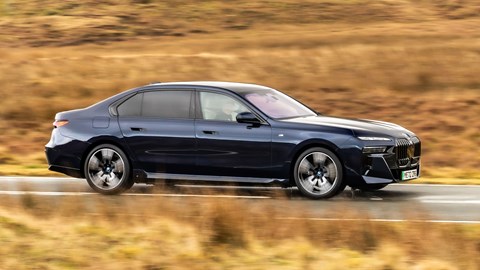
Best for: Affluent buyers seeking a harmonious blend of luxury and electric performance
Pros: Unparalleled luxury, robust performance, and impressive charging capabilities
Cons: Some may find the design polarising; rivals offer competitive features.
The BMW i7 is the Munich’s ultimate statement of luxury in the electric domain, and in practice it redefines the standards of opulence in EVs. Priced from a premium £107k, this electric iteration of BMW’s flagship 7-Series limousine stretches almost 5.5 metres and weighs over 2.7 tonnes. Running through all 5.5 metres under the passengers, the i7 houses a 101.7kWh battery, allowing for an impressive WLTP range of up to 388 miles. The performance figures are impressive too; with its dual electric motors, the i7 churns out a combined 536bhp and 549lb ft of torque, propelling the car from 0-62mph in just 4.7 seconds. When it comes to charging, the i7 doesn’t lag either, adding 106 miles in a brisk 10 minutes with a 195kW DC charger.
Inside, passengers are treated to the best and most luxurious Munich has to offer; the i7 comes complete with the brand’s Curved Display iDrive system, ambient lighting, and plush interior materials. While the i7 performs well amongst cars like the Mercedes EQS, it faces stiff competition from lesser rivals like the Tesla Model S in terms of range and performance. Where the i7 truly shines is in its meticulous blend of luxury, tech, and driving dynamics, setting it apart in the luxury EV segment – and particularly its EQS counterpart.
Read our full BMW i7 review.
View BMW i7 lease deals VIEW OFFER
Hyundai Ioniq 5
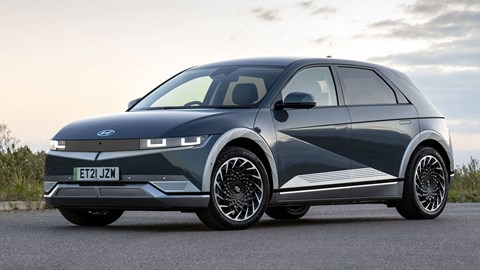
Best for: Individuals seeking a stylish and efficient family EV with cutting-edge features
Pros: Futuristic design, spacious interior, and rapid charging capabilities
Cons: Some rivals offer a more dynamic driving experience; design might polarize opinion
The Hyundai Ioniq 5 hatchback combines futuristic aesthetics with impressive performance. With prices starting from £43,150 for the Premium variant, it offers a range of up to 315 miles, though real-world figures suggest around 260 miles for the all-wheel-drive version. The vehicle’s design, inspired by the 1970s Pony Coupe, is a refreshing blend of retro and modern, with pixelated lighting and a spacious interior. Inside, the cabin boasts a movable center console, two large screens, and comfortable seating. The vehicle’s tech offering is punchy too, with features like the Blind Spot View Monitor and an augmented-reality head-up display.
The Ioniq 5’s dimensions are deceptive; it’s larger than it appears, rivaling the VW ID.4 in size, and when parked next to competitors like the Jaguar i-Pace and VW ID.3, the Ioniq 5’s design feels more contemporary. Charging is efficient, with the ability to charge from 10% to 80% in just 18 minutes.
Overall, the Hyundai Ioniq 5 is a compelling choice for those seeking a blend of style, performance, and practicality in an EV. And it’s a little cheaper than the more conservative EV6.
Read our full Hyundai Ioniq 5 review.
View Hyundai Ioniq 5 lease deals VIEW OFFER
Tesla Model 3
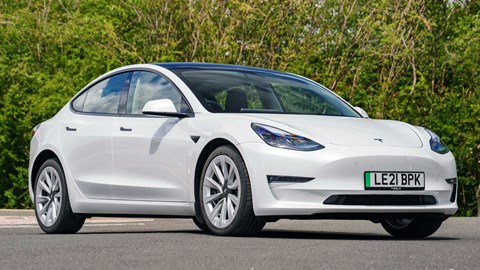
Best for: Those seeking a high-performance electric car with a blend of practicality and advanced technology
Pros: Impressive battery range, spacious and modern interior, and user-friendly tech
Cons: Faces strong competition from newer models; customer service concerns
The Tesla Model 3, often likened to the Apple iPhone of the automotive world, has helped to shake up the electric car market by striking a balance between straight-line performance, affordability and interior tech. The range has a starting price of £42,990 for the standard Model 3, which extends to £50,990 for the Long Range and peaks at £57,990 for the Performance variant. Range is competitive range, with the entry-level model boasting 305 miles, the Performance version stretching to 340 miles, and the Long Range variant leading with 374 miles.
The Model 3’s design is unmistakably Tesla, with a low nose, tapering rear, and expansive glasshouse. Inside, the minimalist cabin is dominated by a 15.0-inch touchscreen, which controls almost all the car’s functions – for better or worse. As for driving, the Model 3 offers the stop-and-go thrills we’ve come to expect from EVs, especially in the Performance variant which claims a 0-60mph time of 3.1 seconds.
While the Model 3 has been a game-changer, it now faces stiff competition from newcomers like the BMW i4, Hyundai Ioniq 6, and Kia EV6. Despite this, its impressive real-world battery range, spacious interior, and advanced tech make it a top contender in the EV market. It’s just been refreshed with a tweaked design, so there are plenty of deals on the previous model in 2024.
Read our full Tesla Model 3 review.
View Tesla Model 3 lease deals VIEW OFFER
Jaguar I-Pace
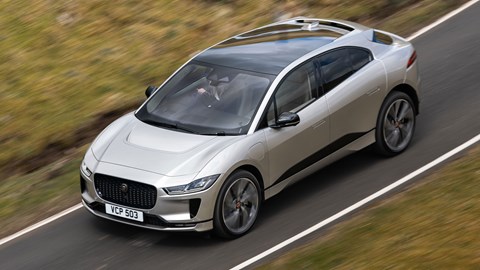
Best for: Those looking for classic Jaguar charm in an EV
Pros: Avant-garde design, impressive performance, and efficient charging
Cons: Real-world range can be less than advertised; faces stiff newer competition
The Jaguar i-Pace, launched in 2017, is still a good proposition in 2025. With a starting price of £43,150, the i-Pace offers a range between 258 to 292 miles, although our experiences suggest a more conservative 225 miles. Despite being around six years old, the i-Pace still feels fresh outside, while inside, the cabin is adorned with a dual-touchscreen system, offering intuitive controls for infotainment and climate functions. Performance-wise, the i-Pace doesn’t disappoint; its dual-motor setup delivers instant torque, propelling the car from 0-62mph in a just 4.8 seconds.
Charging is efficient, with an 80% charge achievable in 40 minutes at a 100kW DC public charger. When compared to rivals, the i-Pace stands out for its blend of style, performance, and practicality but now faces more modern competition from the likes of the Tesla Model Y and Kia EV6.
Despite this, the i-Pace’s combination of thrilling performance, zero emissions, and stylish design makes it a compelling choice.
Read our full Jaguar I-Pace review.
View Jaguar I-Pace lease deals VIEW OFFER
Mercedes-Benz EQE
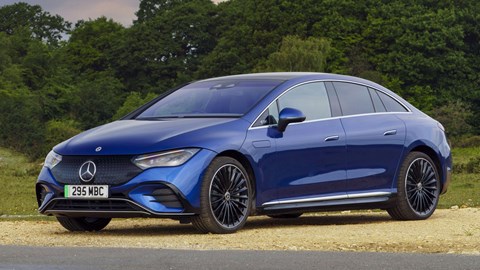
Best for: Mercedes fans looking for an EV
Pros: Luxurious interior, impressive range, and smooth driving dynamics
Cons: Brake feedback could be improved, streamlined exterior design isn’t for everyone
The Mercedes EQE sits just below the EQS in Mercedes’ all-electric EQ range – but it’s arguably better than the electric S- Class. Designed as the electric counterpart to the E-class, the EQE mirrors the body size of its ICE-powered sibling but adopts the distinct styling of the larger EQS.
Priced from around £43,150, the EQE offers a range of 294 to 349 miles, depending on the variant. Underneath its unique exterior lies a well-crafted interior, boasting a dual-touchscreen system and ample space. On the road, the EQE impresses with its calm and composed demeanor. The 350 variant, with its 402bhp, can sprint from 0-62mph in just 4.7 seconds. In contrast, the more affordable 300 model – priced around £5,000 less – offers 241bhp but still provides a refined driving experience.
One notable aspect is the EQE’s recuperative braking system, which adjusts based on driving conditions. However, the actual brakes could offer better feedback. Better than the EQS in most ways, the EQE is currently the best non-SUV EV Mercedes makes – but Munich’s i4 and i7 should be higher on your list.
Read our full Mercedes EQE electric saloon review.
View Mercedes-Benz EQE lease deals VIEW OFFER
Our verdict
Though there are plenty of very strong options on this list, none of them are able to surpass the BMW i7 on pure opulence. Upon its release, it set a real benchmark of what luxurious electric motoring can be like – a high water mark for other manufacturers to aspire to. Sure, the Rolls Royce Spectre may pip the i7 in a few regards, but as for the luxury EVs you can actually get your hands on and don’t cost the same as a suburban terrace house, the i7 leads the pack.
How we test
Every car we get our hands on goes through a rigorous testing process. Our highly experienced team will leave no stone unturned as they put the car through its paces, examining the way it drives, the interior and the price point to name a few criteria. To find out more, head over to our how we test cars page.
Why choose a luxury electric car?
One of the main benefits of electric power in a luxury car is refinement. With no engine, and a greatly simplified drivetrain, there is less noise, vibration and harshness to deal with, resulting in a more comfortable and relaxing experience.
Then, although presumably of less concern to many luxury EV buyers, there are running cost advantages in the form of reduced servicing requirements, as well as potentially significant savings on the fuel costs front – but do remember to factor the price of high-speed charging in if you’re going to routinely be using the car for long trips, as the costs can stack up quickly.
And, of course, there are the environmental benefits, locally speaking at least, such as reduced noise and zero-emissions operation; if you’re regularly driving through urban areas, or sitting in traffic, your car’s clean and quiet nature will be appreciated by those around you.
Who are luxury electric cars suited to?
Most of these all-electric options combine impressive ranges with ultra-fast charging capabilities, allowing them to cover long distances in one bound and then be ready to do it again very quickly. Consequently, many drivers – particularly once they’ve familiarised themselves with EV ownership, route planning and charging networks – shouldn’t find them problematic to live with.
If you routinely drive extended distances at long speeds and don’t want to stop, or you regularly have to take detours or alter your destination, you might still want to consider a conventional petrol or diesel car. Alternatively, a plug-in hybrid could serve as a good halfway house, providing you all-electric motoring for your shorter trips, and the flexibility to continue on, whatever the conditions and wherever the destination, once you’ve expended the battery.
What is the future of luxury electric cars?
You’ll be seeing more of them, that’s for sure; Land Rover, for example, already has an all-electric Range Rover in the works. There are even more upcoming options such as the Lucid Air and Rolls-Royce Spectre.
More brands are making the shift to electric power, too, especially as legislation and market demands continue to change. And, as battery technology improves, ranges grow, and charging times fall, electric luxury cars will become even easier to use and live with.
What is the best-selling electric car now?
The Tesla Model Y remains as the UK’s best-selling electric vehicle, with 35,889 of them sold last year, according to figures provided by the SMMT. The MG4 follows with 21,715 sold in 2023 while the Audi Q4 e-tron rounds off the podium with 16,757.
What is the most expensive EV car on the market?
A few ultra-premium EVs have been unveiled in recent years with eye-watering price tags. The Lotus Evija had a long development process, including a quick go around the Nurburgring in an X track special, and was priced at around £2m when new. The Battista from Automobili Pininfarina also had a seven-figure price tag around the £2.5m mark. No one said the future of hypercars would be cheap…
Curtis Moldrich is the digital editor of CAR magazine, and has worked on the brand for six years. He’s driven every car in our electric car guides and driven many more hybrid and ICE cars too.